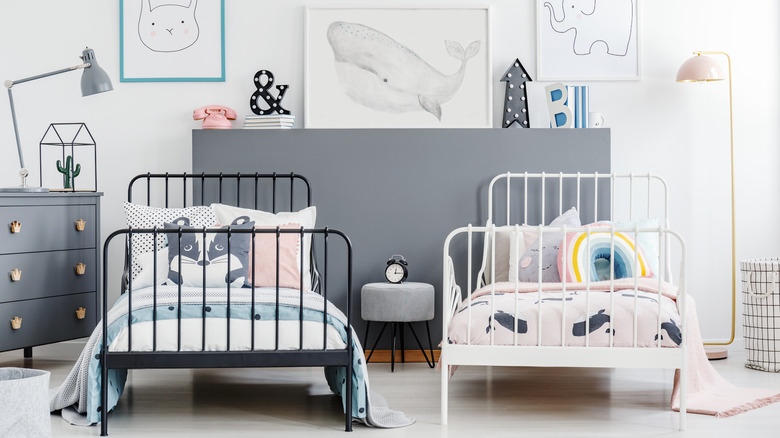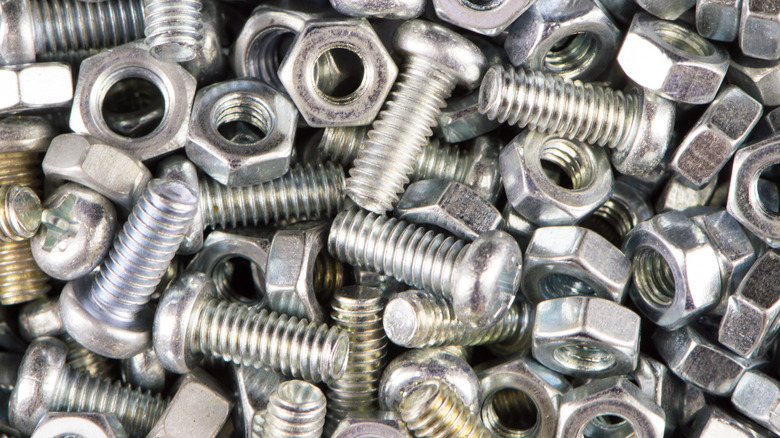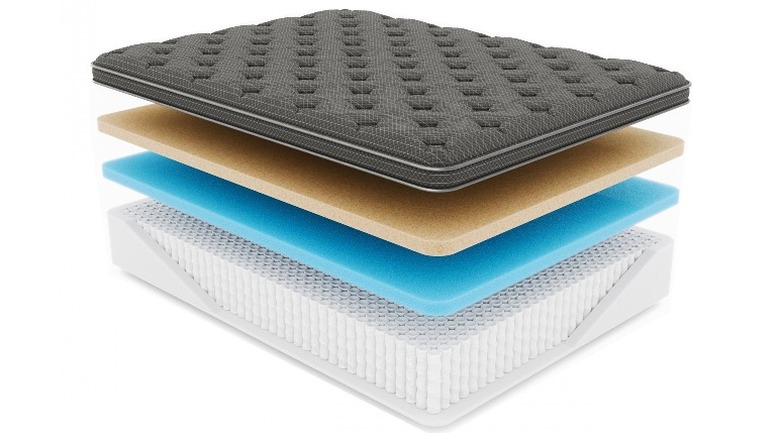Easy Ways To Repair Your Squeaky Bed
Few things are more annoying than having a good night's sleep ruined while you anxiously anticipate the next round of bed squeaks. Fortunately, there are some easy DIY methods to remedy the situation, short of replacing the bed or checking into a sleep clinic. But you can't fix the problem until you discover the cause. To do so, you'll likely need to employ a trial-and-error process, which can help you to pinpoint the issue and determine the most likely source of the sounds, be it the mattress, box spring, bed springs, or the frame itself.
According to The Roundup, 36 million mattresses are sold in the United States annually. The average mattress will then begin to decline after seven to 10 years of use, thus beginning a cycle of structural deterioration. Just like us, older beds become creakier and squeakier. An aging mattress could squeak in response to your body weight, or it could be the bed's structural components that are the noise-producing offenders.
An interrupted deep sleep cycle can negatively impact one's health, per a study published in Nature and Science of Sleep. It's been linked to a host of medical problems, including high blood pressure, depression, obesity, and anxiety. And to any list of harmful sleep disrupters, you could also add a squeaky bed, so the problem shouldn't be ignored. Fortunately, most of the squeaks that accompany one's use of a bed can be put to bed with some thorough analysis, inspection, and basic repairs.
Metal bed frames
Metal rubbing on metal is apt to be noisy, and an inexpensive or poorly made one might squeak and groan. To determine what ails a squeaky metal bed, remove everything in order to access it, per Endurance Beds. When you do so, you may notice erosion or rust, which can be treated with lubricants or rust remover. Another cause of a squeaky metal bed could be inadequately tightened joints. To address this problem, washers should be utilized to improve connections in order to minimize any noise.
Soundproof Living recommends using plastic, rubber, or nylon washers instead of the metal variety. Tightening the components on a metal bed on a regular basis is also advised, as is keeping extra screws and bolts on hand to replace any missing or rusty ones. Further, a hard mattress on a metal frame may be squeaky when its occupant moves. Switching to a softer mattress might be another solution to stopping any associated noise.
Another part of your inspection should be to check the condition of the headboard. One that's too loose is prone to rub against the wall, and it should be moved away a few extra inches to quell the resulting scraping (and noise). According to Endurance Beds, you'll want to tighten the headboard if necessary and inspect and secure the side rails.
A wobbly metal bed may also be a noisy one, and pads can be used to even the legs out. If your bed has wheels, try covering the disks with coaster cups. Removing the wheels and substituting pads should also help to dampen the noise. Padding beneath the bed's foundation may also squelch squeaks.
Wooden bed frames
Wear and tear may be the source of a bed frame squeaking, and a wooden frame is more susceptible to it than a metal one. To check your wooden bed frame, remove the mattress and push the structure around, listening for telltale creaking; also inspect the condition of the headboard and sideboards.
A loose frame can be fortified with corner braces or by inserting additional screws. If you find any broken wooden slats during your inspection, those will need to be fixed as well. You can get wooden slats cut to size from your local home improvement center.
Per Time 4 Sleep, another reason why a wooden bed may be squeaking, however, is that it may have loose joints. The hardware that holds it in place — nails, screws, and bolts — may be rubbing against the wood and if so, will need to be tightened. Those areas can also be lubricated if necessary using silicone or vegetable oil. Beeswax is an effective alternative, but the wax may require several layers to be worthwhile.
Entrepreneurship Life advises applying lubricants to a wooden frame every few months, squeaks or no squeaks. Friction between the mattress and the frame may also produce noise, and sprinkling baby powder there is helpful. The rubbing can also be ameliorated using socks, T-shirts, or other fabrics to line the gaps between the mattress and frame. Heat expansion, warping, or other minor imperfections are possible explanations of a squeaking wood frame as well.
Squeaky mattresses
Chances are, if your mattress is shipshape, the bed frame or floor is responsible for the noise-making, according to The Bedding Mart. Although a mattress is less likely to be the reason why a bed squeaks, if all other causes are eliminated, then it could very well be the mattress.
The mattress, for example, may be worn out from age and its inner springs are shot. Keep in mind that squeaky or not, a mattress should be rotated or flipped several times a year to extend its endurance. A thin plywood board (aka a bunkie board) will also help to prevent squeaking when slipped between the mattress and the frame.
The type of mattress could be key. According to the Sleep Foundation, a foam or latex mattress is inherently squeak-free, so if you have one and hear noises, the bed's foundation is likely to be at fault. In contrast, innerspring or hybrid mattresses have metal springs, which are possible culprits for the noise.
To put it to the test, place the mattress on the floor and lie on it. If it still squeaks, you're out of luck: The mattress is the squeaker and may need to be replaced. The manufacturer's warranty likely excludes an aging mattress, but perhaps a new one may be covered under it. Be sure to properly dispose your mattress if it has reached the end of the line.



